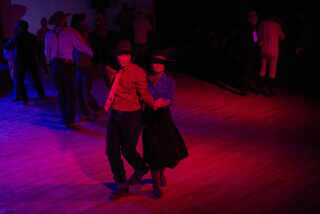PLAYERS PICK BLUEGRASS AS THEIR MUSIC OF CHOICE
- Share via
SAN DIEGO — It’s rooted in the rural mining communities of eastern Kentucky and West Virginia, high up in the Appalachian Mountains.
Rumpled men with leathery faces and sad eyes work all day in the mines, bringing out coal. In the evenings, they round up their families on the creaky front porches of their ramshackle homes, unleash their banjos, fiddles, guitars and mandolins, and play the songs that have been handed down from generation to generation.
The melodies are simple and easy to learn, even for the kids. Some are mournful, some are joyous--it all depends on the words. The lyrics either bemoan the wickedness of fate or celebrate some of the things that make their impoverished lives worth living: the Friday night barn dances, the blue moon in the clear night sky, the faithful woman who has stuck by her man.
Hillbilly music, they used to call it, before Bill Monroe, mandolin picker extraordinaire, dubbed it “bluegrass” a half-century or so ago, after the carpet that covers the mountainsides of his home state of Kentucky.
But whatever the name, it’s the music Vicki Cottle and Walt Richards like most. With the fervor of a pair of backwoods preachers, the two San Diegans have been spreading the bluegrass gospel to their fellow city dwellers for 14 years.
Through their efforts, the simple, homespun folk music of Appalachia is performed by a variety of local players at the Banjo, Fiddle and Guitar Contest each summer in Julian.
The rest of the year, the two are busy running the New Expression music store in North Park, where they sell and teach a full array of stringed instruments commonly associated with bluegrass music: guitar, banjo, fiddle, mandolin, hammered dulcimer and stand-up string bass.
On weekends, though, Cottle and Richards--both in their early 40s--truly practice what they preach. They take the stage themselves with their band, also called New Expression, and perform a mix of traditional bluegrass tunes and contemporary standards at churches, conventions and coffeehouses like the Old Time Cafe in Leucadia.
“What I like most about bluegrass music is that you can play it anywhere,” said Cottle, who plays guitar in the group. “The instruments are all light and relatively inexpensive, and they don’t require any amplification.
“And because the sound is so catchy and simple, and the melodies are so easy to remember, it naturally invites people to join in.
“Last summer, I was sitting in a campground by myself, playing my guitar, and pretty soon there were 30 people all around me, singing along. One woman was even translating the lyrics in sign language to a group of deaf children.”
When Cottle and Richards first started the New Expression band in 1972, the group played only traditional bluegrass tunes, such as Lester Flatt and Earl Scruggs’ “Foggy Mountain Breakdown” and “Rollin’ in My Sweet Baby’s Arms,” Bill Monroe’s “Blue Moon of Kentucky,” and Frank Wakefield’s “New Camptown Races.”
But in later years, Cottle said, the band began using its lineup of bluegrass instruments to perform newer folk, country, and even pop songs, including Simon and Garfunkel’s “The Boxer,” Bette Midler’s “The Rose” and Gordon Lightfoot’s “Early Morning Rain.”
“We call what we’re playing now contemporary acoustic music, or newgrass,” Cottle said. “In most traditional bluegrass songs, the words are very limited. They deal with a way of life that people out here can’t relate to; too many of them say things like ‘beat me, kick me, leave me, then come back and do it all over again.’
“There’s so much more to be said in life than that, though. So what we did was take songs we like--songs that convey a greater range of emotions, a greater reflection of our own feelings--and adapt them to traditional bluegrass instruments.
“To me, expressing what I feel is a real important part of music. If what’s inside me can’t come out, I may as well work behind a computer all day. This way, we have the best of everything: the songs that really mean something to us today, and the bluegrass sound we love so much.”


